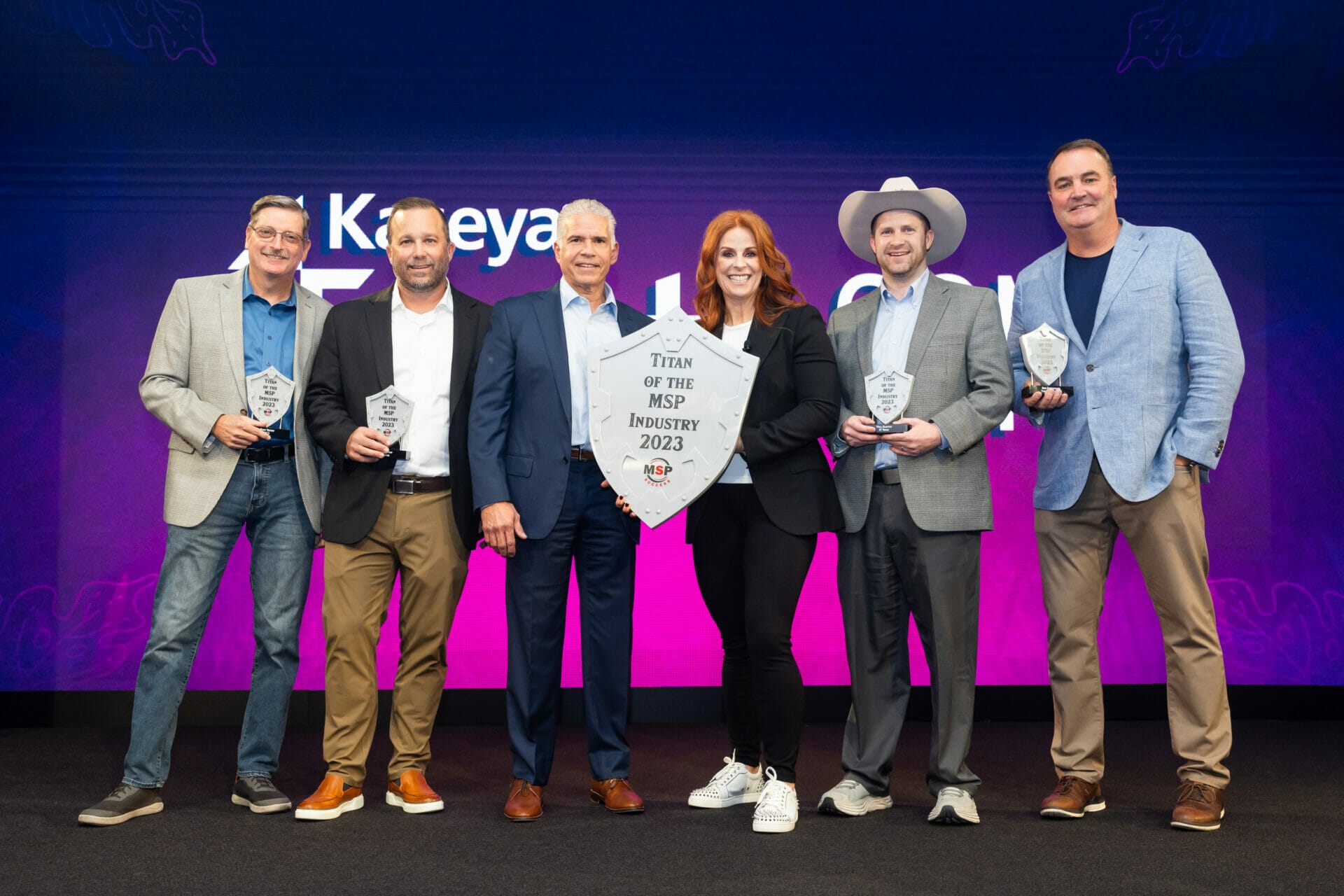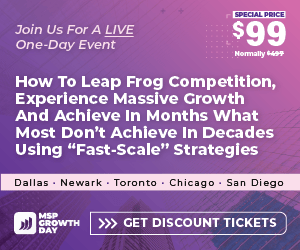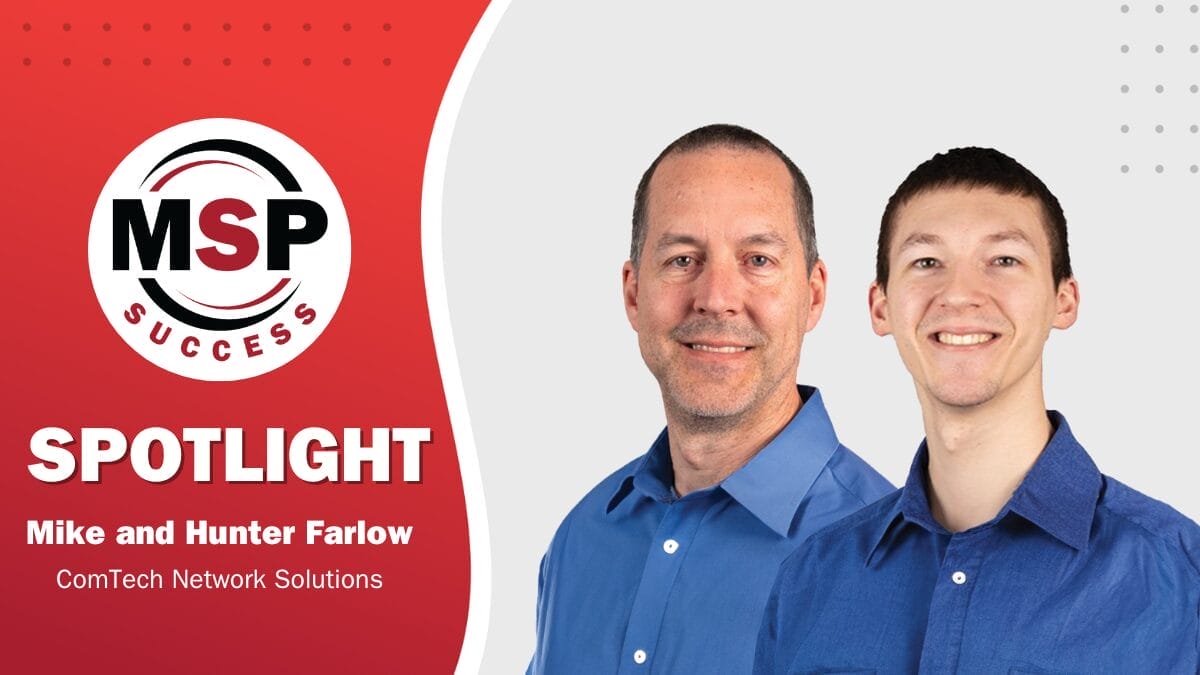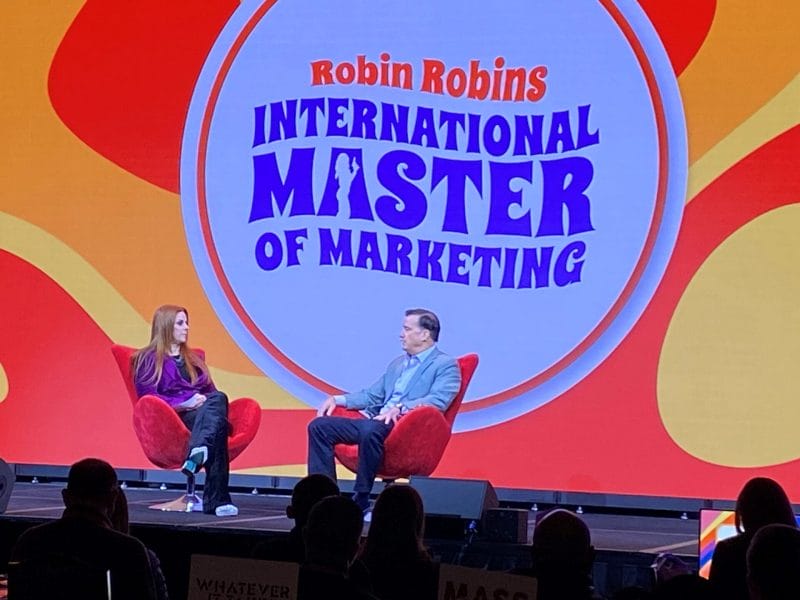After MSP Success CEO Robin Robins interviewed all five finalists for this inaugural award on stage during Kaseya DattoCon, attendees voted United Data Technologies the winner.
UDT, a managed services provider in the Miami-Fort Lauderdale area, was voted the 2023 Titan of the MSP Industry by attendees at Kaseya DattoCon 2023. MSP Success Founder and CEO Robin Robins presented the award to Jesus Peña, EVP and Chief Experience Officer at UDT, who sat on the panel and appeared on behalf of Henry Fleches, CEO of UDT.
Kaseya nominated an exclusive group of Titans of the Industry, 8-figure MSPs who have grown massively profitable businesses, and five were chosen as top finalists for Titan of the Year. They were on stage at DattoCon for a panel discussion moderated by Robin Robins.
The four other finalists were: Will Slappey, CEO of IT Voice; Rob Stephenson, CEO of Thrive Networks; Ryan Vestby, CEO of VC3; and Jason Waldrop, president of the managed service division of Red River.
Henry Fleches, CEO of United Data Technologies, launched the company with Gerard Amaro in 1995 in his parents’ home. Today, UDT has reached $450 million in revenue and is still privately owned, with no outside investors. It grows both organically and via acquisition. The goal, according to Peña, is to reach $1 billion.
Reflecting on his success a few years ago, Fleches noted: “Performance in the past doesn’t dictate your performance in the future. Making sure that you have a good plan, and earn your clients’ business every day, is extremely important. What you’ve done in the past doesn’t ensure their business in the future.”
During the panel discussion, Robins picked the brains of all the finalists to discover additional secrets to success that MSP attendees could apply to their own businesses to either become titans themselves or position themselves for acquisition or merger.
Robins asked all of them if there’s a point at which MSPs cannot continue to grow organically and may need to turn to outside investors.
“I don’t know that there’s a magic number,” said Waldrop. “At some point you’ve got to add a sales force. At some point you’ve got to add back office. At some point you’ve got to do geographic expansion. And each one of those requires an investment. And it’s just about how willing you are to throw back in at each one of those cycles. So, I mean, realistically, can somebody get out past 200 or 300 million in pure recurring services without taking on private equity investment or something? I think that’s very difficult.”
Whether an MSP chooses to take on an investor or not, Stephenson said the most important thing is to have a plan. “It really comes down to what all of you guys want to do. You can run a very successful entrepreneurial business and probably make seven figures. You can have a legacy plan to hand it off to your employees. You could have a family member you want to hand it to… There’s nothing wrong with that.”
Having a capital investor, though, provides an advantage when you’re looking to acquire another MSP, said Vestby.
Slappey added, “Our capital partner does a lot of the due diligence for us, so I can spend the majority of my time running the business, because if you’re trying to do both at the same time, and with a small team, that’s difficult.”
For MSPs looking to sell or merge their business, there are factors to consider in addition to the price a buyer is willing to pay, the panelists agreed. “I think maybe the most important thing, aside from culture and making sure your people are taken care of, is what do you want to do next?” said Waldrop.
For instance, he said, if you want to stay with the buyer, what role do you want to play? From the buyer’s perspective, Waldrop explained, “We want to understand, is this person going to stick around? Do they have the energy to do what we want to do? So, taking inventory of where you are in that moment and then looking forward and articulating that to the buy side is really important for a successful transaction.”
It’s also important for buyer and seller to have those conversations and alignment up front, Stephenson said. “When you have alignment up front, you’re going to be much more successful. If all of those things aren’t mapped out in a 90-day plan, or a six-month plan, or a one-year, two-year, three-year plan where everyone knows what they’re doing, there’s an opportunity for there to be fracture and unhappiness with the transaction.”
To be attractive to buyers, don’t build a lifestyle business, Peña advised. “Don’t build a business that’s based around you. Because when you’re sitting across the table with somebody here, that’s not what we’re looking for. We’re looking for somebody who can run a business, not be the business.”
Vestby added that MSPs also need to move away from owner-based selling. “We all grew up, myself included, in a world where we were taught about principle-based selling. And it was enough as a CEO and owner to fill the bucket every month with one or two deals.” Today, he said, to grow and attract the interest of buyers, “there’s this shift that needs to happen from principle-based selling to a sales staff, and that is where everyone gets excited.”
All the panelists agreed that raising prices, firing bad clients, and having contracts in place can increase EBITDA (earnings before interest, taxes, depreciation and amortization). Even if an MSP has a high EBITDA, though, a low multiple will impact the selling price, the panelists said. Factors that impact the multiple include having one customer that represents a high percentage of the business, or a high customer churn rate.
Robins also asked the Titans about Kaseya’s vision for the IT Complete platform and how MSPs could use it to help them grow.
“I think the vision is the right vision,” Peña said. “There’s two ways to approach this always, right? You either go buy best of breed or what you think is best of breed, or you go buy a platform. They’re both going to do the job. But if you bring a platform together that brings us ease of work, if you’re starting a business or you’re [currently running a business] it’s a no-brainer. You have to go with a platform like this.”
For Stephenson’s part, he said he was really excited about the new Cooper Bots business process automation Kaseya announced. “If you can remove humans from [some transactions] and friction, it’ll allow you to grow faster,” he said. “We’ve been a customer since early 2000. The vision that Fred laid out… making these integration investments and building AI and automation to bring all these tools together, I think the future is really, really bright for IT.”
Waldrop added, “If you’re early stage or just getting one off the ground, you can come to Kaseya and get pretty much everything you need to run the business.”
To access the interviews Robins conducted with The Titans of the MSP Industry, go to www.mspsuccess.com/titans









